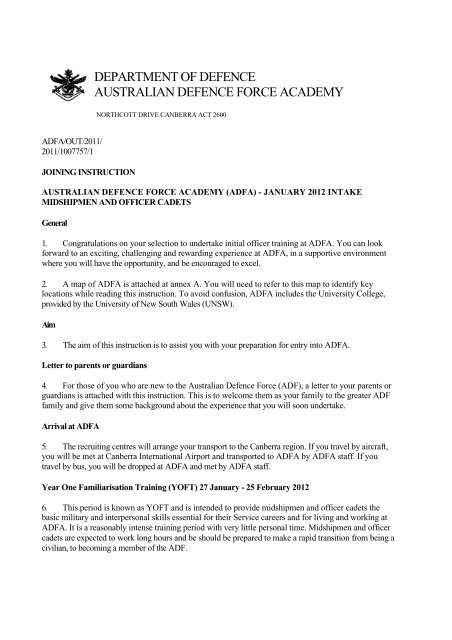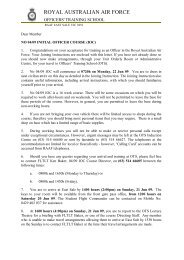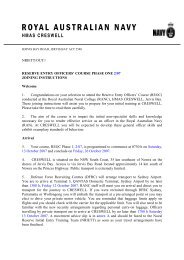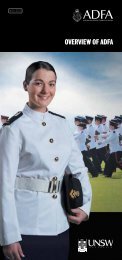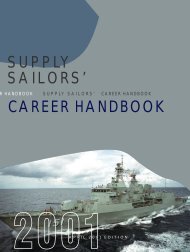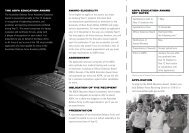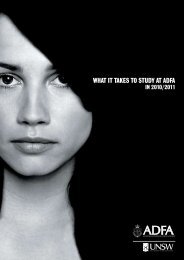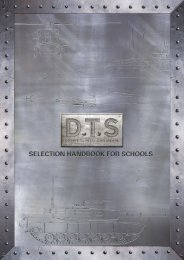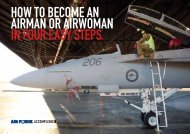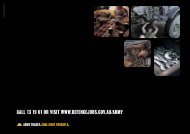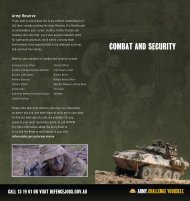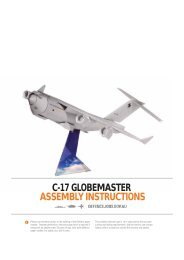Department of defence - Australian Defence Force Recruiting
Department of defence - Australian Defence Force Recruiting
Department of defence - Australian Defence Force Recruiting
You also want an ePaper? Increase the reach of your titles
YUMPU automatically turns print PDFs into web optimized ePapers that Google loves.
ADFA/OUT/2011/<br />
2011/1007757/1<br />
JOINING INSTRUCTION<br />
DEPARTMENT OF DEFENCE<br />
AUSTRALIAN DEFENCE FORCE ACADEMY<br />
NORTHCOTT DRIVE CANBERRA ACT 2600<br />
AUSTRALIAN DEFENCE FORCE ACADEMY (ADFA) - JANUARY 2012 INTAKE<br />
MIDSHIPMEN AND OFFICER CADETS<br />
General<br />
1. Congratulations on your selection to undertake initial <strong>of</strong>ficer training at ADFA. You can look<br />
forward to an exciting, challenging and rewarding experience at ADFA, in a supportive environment<br />
where you will have the opportunity, and be encouraged to excel.<br />
2. A map <strong>of</strong> ADFA is attached at annex A. You will need to refer to this map to identify key<br />
locations while reading this instruction. To avoid confusion, ADFA includes the University College,<br />
provided by the University <strong>of</strong> New South Wales (UNSW).<br />
Aim<br />
3. The aim <strong>of</strong> this instruction is to assist you with your preparation for entry into ADFA.<br />
Letter to parents or guardians<br />
4. For those <strong>of</strong> you who are new to the <strong>Australian</strong> <strong>Defence</strong> <strong>Force</strong> (ADF), a letter to your parents or<br />
guardians is attached with this instruction. This is to welcome them as your family to the greater ADF<br />
family and give them some background about the experience that you will soon undertake.<br />
Arrival at ADFA<br />
5. The recruiting centres will arrange your transport to the Canberra region. If you travel by aircraft,<br />
you will be met at Canberra International Airport and transported to ADFA by ADFA staff. If you<br />
travel by bus, you will be dropped at ADFA and met by ADFA staff.<br />
Year One Familiarisation Training (YOFT) 27 January - 25 February 2012<br />
6. This period is known as YOFT and is intended to provide midshipmen and <strong>of</strong>ficer cadets the<br />
basic military and interpersonal skills essential for their Service careers and for living and working at<br />
ADFA. It is a reasonably intense training period with very little personal time. Midshipmen and <strong>of</strong>ficer<br />
cadets are expected to work long hours and be should be prepared to make a rapid transition from being a<br />
civilian, to becoming a member <strong>of</strong> the ADF.
7. As a part <strong>of</strong> this transition your lessons will include drill (marching), physical training, barracks<br />
(accommodation) and uniform maintenance, first aid, weapons training, introductory field training and<br />
adventure training (e.g. abseiling and kayaking).<br />
Life Skills<br />
8. Your arrival at ADFA may be the first occasion you have lived away from home. The transition<br />
to Academy life will be much easier if you come equipped with a number <strong>of</strong> life skills. You will be<br />
required to do your own washing and ironing. You will also be required to keep your room clean and<br />
take part in cleaning <strong>of</strong> common bathroom and laundry facilities that you will share with others, as well as<br />
the cleaning <strong>of</strong> the passageways and other common areas in your accommodation building. None <strong>of</strong> these<br />
activities will be particularly onerous, however, they will be much easier for you if you arrive at<br />
ADFA with some understanding <strong>of</strong> the basics - how to do your laundry, and how to use an iron and<br />
vacuum cleaner.<br />
Private Vehicles<br />
9. Unless you are a current serving member <strong>of</strong> the ADF, do not drive your motor vehicle to ADFA,<br />
as you will not require it during your first six weeks. If you own a motor vehicle, you may apply to<br />
have it brought to ADFA at public expense at a later date. However, you must provide pro<strong>of</strong> that you<br />
owned that vehicle at the time <strong>of</strong> joining the ADF.<br />
Dress<br />
10. On arrival at ADFA you should be dressed in neat attire. The following are the minimum dress<br />
standards expected:<br />
a.<br />
b.<br />
c.<br />
2<br />
Males. A tie (coat optional), long sleeved collared shirt, tailored trousers and leather shoes.<br />
Females. A short sleeved blouse and slacks or skirt <strong>of</strong> no shorter than knee length, where<br />
free movement (for marching) is appropriate. Females are to wear practical low heeled<br />
leather shoes. There is a considerable amount <strong>of</strong> walking involved on induction day and<br />
even the lowest heels tire the feet and are a hazard on the paving around ADFA.<br />
You are also reminded to bring sleepwear appropriate for a mixed gender environment.<br />
Haircuts, Jewellery and Make-up<br />
11. You are required to arrive at ADFA with neat, clean and tidy hair, <strong>of</strong> a single and natural colour.<br />
Females are required to put their hair up in a braid or bun, or to have their hair cut so that it does not<br />
touch the bottom <strong>of</strong> a buttoned shirt collar. To assist in grooming, females should bring plain bobby<br />
pins, comb clips and bun nets, similar in colour to their hair. Scrunchies and other accessories are not to<br />
be worn in uniform. You will need at least four weeks <strong>of</strong> hair supplies for the YOFT period.<br />
12. Males are required to have their hair cut in a short, back and sides, with no unusual length on the<br />
top (college cut). The male haircut is to be tapered towards the neckline and is not to cover the ears or<br />
touch or overhang the shirt collar. The neck is to be clean shaven. All personnel who do not meet these
standards will be given a haircut upon arrival at personal cost. All males' faces are to be clean shaven<br />
on arrival. Examples <strong>of</strong> appropriate haircuts for males and females are attached at annex B.<br />
13. Body piercing is forbidden, however, females may wear one set <strong>of</strong> discreet pierced earrings.<br />
Female makeup (if worn) should be discreet and in good taste. Further information regarding haircuts<br />
or the wearing <strong>of</strong> jewellery and make-up while in uniform will be provided following your arrival at<br />
ADFA.<br />
Personal Effects<br />
14. You are to bring with you adequate supplies <strong>of</strong> civilian clothing, underwear, hosiery, socks,<br />
sleepwear and toiletries. Females should bring enough sanitary and depilatory products to last four<br />
weeks. You will be required to wear appropriate civilian clothing for the first week, whilst you are<br />
fitted for uniforms. Other items you should bring are listed at annex C. Do not bring any bicycles or<br />
other large equipment (eg, golf clubs, large stereo equipment, snowboards etc) with you in the first six<br />
weeks. You will be entitled to a removal at public expense from your home location to ADFA<br />
following the completion <strong>of</strong> your initial training. This will provide the opportunity for larger items to<br />
be brought to ADFA. For further information visit the ADFA website www.unsw.adfa.edu.au<br />
Inoculations<br />
15. Midshipmen and <strong>of</strong>ficer cadets will receive a series <strong>of</strong> inoculations at ADFA, so it is advisable to<br />
bring pro<strong>of</strong> <strong>of</strong> any previous inoculations with you. It is strongly recommended that you bring all<br />
vaccination records with you to provide to medical staff during orientation. This includes childhood<br />
schedules as well as overseas vaccination cards. If you do not bring records, you will be required to<br />
receive the full course <strong>of</strong> military vaccines. Please also ascertain whether you have had chickenpox as a<br />
child prior to arrival. If you have pro<strong>of</strong> <strong>of</strong> your blood group, a copy <strong>of</strong> this would be welcomed. All<br />
these records will be returned to you during the first six weeks.<br />
Personal Computers<br />
16. Do not arrive at ADFA with a personal computer or laptop. If you do choose to bring a laptop it<br />
will be taken <strong>of</strong>f you, and securely stored for the duration <strong>of</strong> initial training. Computers will not be<br />
required until the start <strong>of</strong> tertiary study in early March. ADFA will make arrangements for you to<br />
purchase equipment at a competitive cost, if required. Each room has provision for a computer to be<br />
connected to the University Network and Internet. There will be no access to the Internet in the first six<br />
weeks <strong>of</strong> training due to the intensity <strong>of</strong> the YOFT period; however, you may choose to have your<br />
computer delivered with your personal effects at the completion <strong>of</strong> initial training.<br />
Accommodation<br />
17. At ADFA, you will be provided with your own private and secure room. These rooms are<br />
comfortable with plenty <strong>of</strong> shelf and cupboard space. Four rooms are grouped in a corridor with a<br />
shared laundry (washing machine and dryer) and bathroom (toilet, shower, washbasin and mirror). You<br />
will be responsible for cleaning your room and sharing the cleaning <strong>of</strong> the common areas with your<br />
peers. Cleaning equipment is supplied. Accommodation rooms, bathrooms and laundries are inspected<br />
regularly for cleanliness and neatness by ADFA staff. Each accommodation block has three floors <strong>of</strong> 16<br />
rooms with a central recreation room furnished with a television, DVD player, sound system, lounge<br />
3
chairs, and a kitchenette with a microwave and refrigerator. The consumption and storage <strong>of</strong> alcohol in<br />
the accommodation blocks at any time is strictly prohibited.<br />
18. You will be accommodated in a Tri-Service (i.e., Navy, Army and Air <strong>Force</strong>) and mixed gender<br />
environment at ADFA.<br />
Visitors<br />
19. Only in exceptional circumstances will midshipmen and <strong>of</strong>ficer cadets be permitted to receive<br />
visitors during programmed working hours or sports periods. For reasons <strong>of</strong> welfare and security,<br />
visitors are not permitted to enter the accommodation blocks without appropriate authorisation from<br />
respective Divisional Officers (DO), or the Academy Duty Officer (ADO) outside working hours. No<br />
visitors are permitted during the YOFT period.<br />
Foster Family Scheme<br />
20. This scheme recruits 'foster families' in the Canberra area who are willing to 'adopt' a midshipmen<br />
or <strong>of</strong>ficer cadet. The scheme is intended to assist first-year midshipmen and <strong>of</strong>ficer cadets<br />
to settle in to the Academy away from their normal family environment. First-year midshipmen and<br />
<strong>of</strong>ficer cadets may apply to be allocated a family during their first weeks at ADFA. The scheme is<br />
voluntary for <strong>Australian</strong> midshipmen and <strong>of</strong>ficer cadets and strongly encouraged for foreign cadets.<br />
Academy Cadets Mess (ACM)<br />
21. The ACM comprises food preparation areas, dining areas, recreation rooms, a bar, c<strong>of</strong>fee lounge<br />
and dry cleaning services. Although the ACM bar is open for use by all ADFA midshipmen and <strong>of</strong>ficer<br />
cadets, the purchase or consumption <strong>of</strong> alcoholic beverages in the ACM by midshipmen and <strong>of</strong>ficer<br />
cadets, guests and other visitors less than 18 years <strong>of</strong> age is prohibited. You will not be permitted to<br />
consume alcohol during YOFT due to the intensity and tempo <strong>of</strong> training.<br />
22. As a member <strong>of</strong> the ACM, you will be required to pay a monthly membership fee <strong>of</strong> $20.00,<br />
which covers the day-to-day administration costs <strong>of</strong> the ACM. The minimum civilian dress<br />
requirements in the ACM are as follows:<br />
Male civilian attire Female civilian attire<br />
Working Week (0615 hours Monday to 1700 hours Friday)<br />
Tailored trousers with belt. (note 1)<br />
Summer: Collared shirt without slogans.<br />
(note 2)<br />
Winter: Collared shirt without slogans and<br />
tie. (note 2)<br />
Notes<br />
1. Tailored is defined as trousers <strong>of</strong><br />
conservative design, with belt loops. Threequarter<br />
trousers or cargo trousers are not to be<br />
worn.<br />
2. All shirts are to be tucked in at all times<br />
4<br />
Tailored trousers/slacks, skirt, dress, culottes<br />
(not to be more than 10cm above knee).<br />
Blouse with sleeves and collar (Top is not to<br />
be revealing).<br />
Body-tight tops are only to be worn under a<br />
jacket or jumper.<br />
Smart dress jumper/jacket (optional).<br />
Closed toe and heel shoes with stockings or<br />
socks (no stockings necessary in summer).<br />
Court shoes
Male civilian attire Female civilian attire<br />
Weekend (1700 hours Friday until closure Sunday/Public Holidays)<br />
Tailored walk shorts/neat pressed jeans or<br />
equivalent (with belt). (note 3)<br />
Polo-collared shirt minimum, tucked in.<br />
(note 4)<br />
Leather shoes (with socks), boat shoes<br />
(without socks). (note 5)<br />
Smart dress jumper/jacket optional.<br />
Notes<br />
3. Cargo shorts (shorts with external pockets)<br />
are not to be worn.<br />
4. Polo shirts and football jerseys are not to<br />
have numbers on the back.<br />
5. Skate shoes are not permitted.<br />
Getting Fit for ADFA<br />
23. Sport and physical training play an important part in Service life. It is essential that you arrive at<br />
ADFA with a good base level <strong>of</strong> fitness, otherwise you will be at a greater risk <strong>of</strong> injury that could<br />
affect your ability to complete your military training. Before you arrive at ADFA, you are strongly<br />
encouraged to do some form <strong>of</strong> endurance training, such as taking long walks (40 - 60 minutes) and/ or<br />
bushwalking, getting used to being on your feet for extended periods and building up lower leg<br />
muscles. This kind <strong>of</strong> training should help prepare you for standing, running, walking, marching and<br />
drill movements. Good eating habits are also essential, especially eating breakfast. Fatigue can become a<br />
big factor during the first six weeks, therefore learning how to cope with the effects <strong>of</strong> fatigue would be<br />
beneficial.<br />
24. The primary aim <strong>of</strong> physical training at ADFA is to educate you in the values <strong>of</strong> maintaining a<br />
healthy lifestyle. Additionally, physical training promotes teamwork and ensures that you develop and<br />
maintain the level <strong>of</strong> fitness that will enable you to pass your individual single-Service fitness test,<br />
which is an ADFA graduation requirement. Muscular strength, muscular endurance and cardio-<br />
respiratory endurance are the main components <strong>of</strong> the fitness tests. You will also undergo a swim test to<br />
establish individual swimming competency.<br />
Sports at ADFA<br />
25. ADFA <strong>of</strong>fers a wide range <strong>of</strong> indoor and outdoor sporting facilities, including an outdoor<br />
climbing wall, and caters for a wide range <strong>of</strong> team and individual sports. Sports available at ADFA<br />
include:<br />
• Athletics<br />
• <strong>Australian</strong> Rules Football (men & women)<br />
• Netball (ladies & mixed)<br />
5<br />
Tailored shorts/neat pressed jeans or<br />
equivalent, skirt, dress, culottes (to be no<br />
more than 10cm above knee).<br />
Short sleeve blouse with collar minimum.<br />
Smart dress jumper/jacket (optional)<br />
Leather shoes (with socks), boat shoes, court<br />
shoes, leather sandals (all without socks, are<br />
optional).<br />
Top is not to be revealing. Body-tight tops<br />
are only to be worn under jacket or jumper.<br />
Females are not required to tuck in shirts that<br />
are tailored accordingly, however Polo shirts<br />
and rugby jerseys are to be tucked in.<br />
• Basketball<br />
• Cricket (including indoor)<br />
• Hockey
• Rowing<br />
• Triathlon<br />
• Volleyball<br />
• Cross-Country<br />
• Squash<br />
• Fencing<br />
• Sailing<br />
UNSW@ADFA Information for new undergraduate students<br />
Accept Online - Student ID number and UNIPass password<br />
26. Students when they 'accepted' their UNSW <strong>of</strong>fer, were issued with a student identification<br />
number (e.g. z1234567) and generated a unique UNIPass password. Students MUST write these two<br />
items down and bring them to the "New Enrolment Session" (see paragraph 28 b). This information is<br />
ESSENTIAL in being able to access the web portal myNSW to complete their enrolment into courses<br />
and other class activities, such as tutorials and/or laboratory classes.<br />
Information Sessions<br />
27. The University <strong>of</strong> New South Wales at ADFA (UNSW@ADFA) will be conducting three<br />
information sessions before classes commence in 2012. These sessions are compulsory for all new<br />
undergraduate students. For Naval midshipmen and Air force <strong>of</strong>ficer cadets, you are to ensure that you<br />
enrol in the degree which was <strong>of</strong>fered by your parent service. You cannot alter your degree without<br />
military approval.<br />
28. There will be three separate information sessions conducted by UNSW@ADFA staff during<br />
YOFT. They are outlined as follows:<br />
a.<br />
c.<br />
d.<br />
6<br />
• Rugby Union (men & women)<br />
• Soccer<br />
• Touch Football<br />
• Water polo<br />
• Swimming<br />
• Tennis<br />
• Dragon Boating<br />
A credit application session will be conducted on Tue 07 Feb 12. Information is provided<br />
below on what you must bring to this session. Once you have submitted your application,<br />
the relevant Undergraduate Coordinator will assess your application in preparation for<br />
enrolment.<br />
A new enrolment session will be conducted on Thur 16 Feb 12. During this session you<br />
will be welcomed into the UNSW@ADFA community, attend academic briefings,<br />
including presentations specific to your degree, have the opportunity to discuss your<br />
enrolment with UNSW@ADFA staff and complete your online enrolment in your courses<br />
and tutorials and/or laboratory classes. Engineering and Technology students will also be<br />
given a tour <strong>of</strong> laboratories and facilities. Students who have applied for credit can discuss<br />
with the relevant Undergraduate Coordinator the outcomes <strong>of</strong> their application and seek<br />
advice on enrolment.<br />
Language and Learning (ALL) Unit will also give a presentation on what support programs<br />
they <strong>of</strong>fer students at ADFA.
Handbook and Course Selection<br />
2 9 . An electronic searchable copy <strong>of</strong> the ADFA Handbook is available at<br />
www.unsw.adfa.edu.au/student. A hardcopy <strong>of</strong> the 2012 ADFA Handbook will be available to you<br />
when you arrive at ADFA. It is important that you familiarise yourself with the contents <strong>of</strong> the<br />
Handbook before you arrive at ADFA, particularly the information relating to courses <strong>of</strong> study<br />
available in your degree. Further advice on course selection will be provided at the new enrolment<br />
session, along with the opportunity to speak with academic staff about your specific degree.<br />
Credit for Previous University Study<br />
30. Students who have completed previous university studies may wish to apply for credit toward their<br />
UNSW@ADFA degree. In such cases, it is critical that you bring an original or certified true copy<br />
<strong>of</strong> your academic transcript and full subject/ course outlines to ADFA. You must bring this information<br />
and a completed "Credit Application" form to the credit application session on Tue 07 Feb 12. Failure<br />
to do so may prevent you from completing your online enrolment. To download this form and to seek<br />
further information on credit for previous studies go to the UNSW@ADFA Student Gateway at<br />
www.unsw.adfa.edu.au/student/credit<br />
Chief <strong>of</strong> the <strong>Defence</strong> <strong>Force</strong> (CDF) Parade - Saturday, 03 March 2012<br />
31. During the week following YOFT, you will spend time preparing for the CDF Parade. This parade<br />
marks the completion <strong>of</strong> initial training for first-year midshipmen and <strong>of</strong>ficer cadets at ADFA.<br />
The current CDF is General D.J. Hurley, AC, DSC, who, if available, will review the CDF Parade on<br />
Sat, 03 Mar 12. Family members and friends are most welcome to attend this parade, and a separate<br />
letter <strong>of</strong> invitation will be sent out during YOFT to your nominated next <strong>of</strong> kin. Local area leave will<br />
be granted to allow midshipmen and <strong>of</strong>ficer cadets to visit with their families for part <strong>of</strong> this weekend.<br />
Further details about CDF Parade will be placed on the ADFA web page, closer to the event date.<br />
Studying at ADFA<br />
32. The academic year is divided into two sessions totalling 32 weeks. Breaks during the year provide<br />
opportunity for single service training, leave, academic field trips, military tours and<br />
excursions, adventurous training, study and examination preparation. The academic session will begin on<br />
05 Mar 12. Please refer to the ADFA website on the Internet for further information.<br />
33. At ADFA, you will undertake a two or three-year program <strong>of</strong> military training (dependant on your<br />
degree), designed to provide you with the skills, knowledge and attitudes necessary for your<br />
integration into Service life. Your military training at ADFA will involve:<br />
a.<br />
b.<br />
7<br />
Academy Military Education and Training. Subjects studied during Academy Military<br />
Education and Training include leadership and management skills, drill and ceremonial,<br />
<strong>defence</strong> studies, weapon training, military law, mess customs and etiquette, an oral and<br />
written communications program, physical and recreational training, stress management,<br />
first aid and health, and alcohol and drug awareness.<br />
Single Service Training. Single Service Training occurs twice each year for all<br />
midshipmen and <strong>of</strong>ficer cadets. First-year midshipmen and <strong>of</strong>ficer cadets undertake Single<br />
Service Training during July and November/December. During Single Service Training,<br />
midshipmen and <strong>of</strong>ficer cadets are employed by their respective Services exposing them to
Daily Routine at ADFA<br />
8<br />
a single-service environment and providing an insight into single-service environments.<br />
Single Service Training is conducted at a variety <strong>of</strong> Navy, Army and Air <strong>Force</strong> training<br />
establishments and operational units/ships.<br />
34. Daily routine during academic sessions (Mon - Fri) is as follows:<br />
a.<br />
b.<br />
c.<br />
d.<br />
e.<br />
Reveille (awaken) at 0600 h;<br />
Roll call, breakfast and cleaning ablutions from 0600 to 0700 h;<br />
Military training from 0700 h to 0800 h;<br />
Academic and AMET periods are divided into nine 50-minute periods from 0800 h to 1830<br />
h; and<br />
Additional activity is regularly scheduled after 1700 h.<br />
35. Throughout the year breakfast is available 0615 - 0800 h, lunch 1050 - 1345 h and dinner is served<br />
from 1800 - 1945 h.<br />
Return <strong>of</strong> Service Obligation<br />
36. Training at ADFA attracts a Return <strong>of</strong> Service Obligation. A serving member who has completed or<br />
partially completed training will normally be required to serve for a stipulated period prior to being<br />
permitted to leave the ADF. This period is normally one year for each completed year <strong>of</strong> training plus one<br />
additional year.<br />
Resignations<br />
37. Resignations are not permitted during the first five weeks at ADFA in order to allow midshipmen<br />
and <strong>of</strong>ficer cadets to experience at least an initial period <strong>of</strong> military training. This period will allow<br />
midshipmen and <strong>of</strong>ficers to make a well informed decision regarding resignation from ADFA.<br />
Local Leave<br />
38. Local area leave (known as short leave) at ADFA is managed via a tiered system. Under this<br />
system, midshipmen and <strong>of</strong>ficer cadets may take local leave in the Canberra area on approved days<br />
when not required for duty. This leave is restricted in First Year but increases as you progress year<br />
levels, and also for those who are able to demonstrate a high level <strong>of</strong> performance in their academic<br />
and military studies. There is no local leave from Monday through to Thursday for First Year<br />
midshipmen and <strong>of</strong>ficer cadets, during first session 2012. Your Divisional Staff may, however, grant<br />
additional leave on request. On weekends, midshipmen and <strong>of</strong>ficer cadets under the age <strong>of</strong> 18 may only<br />
stay out beyond midnight if they are staying at an address pre-approved by their parents. Please be<br />
aware there will be no local leave approved during the conduct <strong>of</strong> YOFT.
Recreational Leave<br />
39. You will receive four-to-five weeks <strong>of</strong> leave during the Christmas and New-Year break and may be<br />
entitled to short leave during the Easter period. For single members, the Commonwealth provides<br />
two free travel trips per year to your nominated NOK address. The first opportunity for an extended<br />
period <strong>of</strong> leave occurs at Easter. Applications for Easter leave will be initiated on arrival at ADFA,<br />
depending on your academic commitments. You may have the opportunity to take leave in May. The<br />
Commonwealth will not reimburse any fares/travel expenses for leave that has been previously<br />
arranged by the member. You may wish to apply for Christmas leave utilising your second free travel<br />
entitlement.<br />
Emergency Contact<br />
40. ADFA has a 24 hour duty system which parents may utilise if there is an urgent requirement to<br />
contact a midshipman, <strong>of</strong>ficer cadet or staff member after hours. The Academy Duty Officer (ADO)<br />
number is (02) 6268 8111.<br />
Personal Administration<br />
41.<br />
42.<br />
Your postal address whilst at ADFA is:<br />
Employee ID, rank (eg, midshipman or <strong>of</strong>ficer cadet), initials, surname<br />
Division number and Squadron number (allocated once you get to ADFA)<br />
<strong>Department</strong> <strong>of</strong> <strong>Defence</strong><br />
PO Box Number (allocated once you get to ADFA)<br />
CANBERRA BC<br />
ACT 2610<br />
Change <strong>of</strong> address notifications should be made to:<br />
a.<br />
b.<br />
c.<br />
d.<br />
e.<br />
Personal Documents<br />
insurance companies,<br />
driver's licence issuing authorities,<br />
motor vehicle registration authorities,<br />
banks or building societies, and<br />
all similar agencies with which you have dealings.<br />
43. A list <strong>of</strong> personal documents that you MUST bring to ADFA is attached at annex C.<br />
Personal Particulars<br />
9
44. Please complete the personal particulars form attached at annex E and return to your local<br />
recruiting unit as soon as possible.<br />
Pay<br />
45. You will be paid each Thursday fortnight and your pay will be deposited directly into your<br />
nominated bank or credit union account. You are to arrive at ADFA with details <strong>of</strong> your bank/credit<br />
union account including BSB number. If you do not have an account, an opportunity will be made<br />
available during YOFT to open an account at either the <strong>Defence</strong> <strong>Force</strong> Credit Union (DEFCREDIT) or<br />
the <strong>Australian</strong> <strong>Defence</strong> Credit Union (ADCU). Both these credit unions are located at ADFA. All<br />
members <strong>of</strong> the <strong>Australian</strong> <strong>Defence</strong> <strong>Force</strong> pay tax; therefore you are required to bring a Tax File<br />
Number (TFN) with you. If you do not already have a TFN, you must obtain one before arrival at<br />
ADFA. Additionally all members contribute to the Military Superannuation Benefits Scheme (MSBS)<br />
and pay a charge for rations and quarters (R&Q). R&Q includes meals, accommodation and utilities.<br />
These amounts are deducted automatically from your fortnightly net pay.<br />
Cash<br />
46. You should bring sufficient cash with you for the purchase <strong>of</strong> essential items during the first few<br />
weeks until your first pay is received. An amount <strong>of</strong> $200 is suggested (and is the maximum).<br />
Support Services at ADFA<br />
47. Psychology and Counselling Service. <strong>Defence</strong> provides qualified, dedicated counselling staff that<br />
you may approach for assistance.<br />
48. Medical and Dental Services. Full medical services are provided by Duntroon Health Centre<br />
which is situated behind the ADFA Indoor Sports Centre and across General Bridges Drive.<br />
Midshipmen and <strong>of</strong>ficer cadets incur no cost for consultations, treatment, and prescription costs arising<br />
from illness or injury.<br />
49. Chaplains. There are three Chaplains at ADFA, one from each Service. These Chaplains are the<br />
referral points for midshipmen and <strong>of</strong>ficer cadets <strong>of</strong> all denominations and religions. The Chaplains<br />
conduct sessions in character development for all midshipmen and <strong>of</strong>ficer cadets as part <strong>of</strong> their<br />
military training. The spiritual support and personal development <strong>of</strong> midshipmen and <strong>of</strong>ficer cadets and<br />
staff are the Chaplains' priorities. The Chaplains are available at all times to provide confidential<br />
pastoral and counselling ministry to midshipmen, <strong>of</strong>ficer cadets and staff.<br />
50. Spiritual and personal development is encouraged through worship services at ADFA, and on<br />
Sunday by worship at the ANZAC Memorial Chapel <strong>of</strong> St Paul in nearby Duntroon. Several Sunday<br />
church services are scheduled for midshipmen and <strong>of</strong>ficer cadets wishing to attend during YOFT.<br />
Weekday services are also available in the smaller ADFA chapel following the completion <strong>of</strong> YOFT.<br />
Voluntary Bible studies and a Sunday evening fellowship are also conducted. Times and venues are<br />
advertised regularly.<br />
Facilities at ADFA<br />
10
51. The following facilities are available at ADFA:<br />
Academy Library<br />
Hairdressing Salon<br />
C<strong>of</strong>fee shop<br />
Bookshop<br />
<strong>Defence</strong> <strong>Force</strong> Credit Union<br />
<strong>Australian</strong> <strong>Defence</strong> Credit Union<br />
Telephones<br />
11<br />
Automatic Teller Machine<br />
Post Boxes<br />
Taxi rank<br />
Public Buses<br />
52. Midshipmen and <strong>of</strong>ficer cadets do not have ready access to their mobile phone during the day, as<br />
they will not be able to be carried during training sessions in YOFT. When training permits you may be<br />
allowed a brief period each evening in order to access your mobile phone. You should ensure that you<br />
have sufficient credit or prepaid cards to cover a four week period. Access from outside ADFA is<br />
available via the switchboard on (02) 6268 8111. Ensure your families have the ADFA telephone<br />
number for contact in case <strong>of</strong> an emergency. Squadron staff also have the option <strong>of</strong> allowing use <strong>of</strong><br />
their work phones should an urgent need arise.<br />
ADFA Band<br />
53. ADFA supports a Concert (Military) Band, including bagpipe, percussion and woodwind<br />
sections, under the administration and conduct <strong>of</strong> a member <strong>of</strong> the <strong>Australian</strong> Army Band Corps. The<br />
Band rehearses regularly and has occasional practice weekends. Membership <strong>of</strong> the Band is voluntary<br />
and midshipmen and <strong>of</strong>ficer cadets who wish to join are encouraged to bring any instruments they own<br />
with them. The Band performs for all ADFA parades and provides musical support for the ADFA stage<br />
production, concert evenings, presentation nights and church services.<br />
Helpful Websites<br />
54. More information about ADFA, UNSW and Canberra can be found at the following websites:<br />
a. www.unsw.adfa.edu.au<br />
b. www.<strong>defence</strong>jobs.<strong>defence</strong>.gov.au/recruit.htm<br />
c. www.<strong>defence</strong>.gov.au/adfa/<br />
The military environment at ADFA<br />
55. Information regarding the military environment at ADFA is attached at annex F and will assist you<br />
with your transition from the civilian to the military environment.<br />
Conclusion<br />
56. If you have any questions or concerns please contact the <strong>Defence</strong> <strong>Force</strong> <strong>Recruiting</strong> Centre where<br />
you applied for ADFA.
57. ADFA demands high standards from its midshipmen and <strong>of</strong>ficer cadets in every regard. Arriving<br />
f i t , h e a l th y a n d a d mi n i s tr a t i v e l y w e l l p r e p a r e d w i l l e n s u r e th e mi n i mu m a mo u n t o f s t r e s s a n d<br />
inconvenience for you during the initial period <strong>of</strong> training.<br />
58. Congratulations once again on your selection to the <strong>Australian</strong> <strong>Defence</strong> <strong>Force</strong> Academy and your<br />
appointment to the <strong>Australian</strong> <strong>Defence</strong> <strong>Force</strong>.<br />
Original signed<br />
P.G. PETERSEN<br />
Colonel<br />
Deputy Commandant<br />
<strong>Australian</strong> <strong>Defence</strong> <strong>Force</strong> Academy<br />
October 2011<br />
Tel: (02) 6268 8500<br />
Annexes:<br />
A. Map <strong>of</strong> ADFA<br />
B. Example <strong>of</strong> appropriate haircuts<br />
C. Personal Items and Documentation Check List to bring to ADFA<br />
D. Personal Particulars Form<br />
E . The Military Environment at the <strong>Australian</strong> <strong>Defence</strong> <strong>Force</strong> Academy<br />
12
Military Facility<br />
1 Administration 33 Academy Staff Club<br />
2 Adams Hall 35 Technical Staff Wing<br />
3 Military Building 36 <strong>Australian</strong> <strong>Defence</strong> Studies Centre<br />
4 Academy Cadets Mess 40 Spectator Stand<br />
5 Indoor Sports Centre 41 Main Q-Store/Document Production Centre<br />
6 Officers Mess 42-43 <strong>Australian</strong> Federation<br />
Guard<br />
7 Senior NCOs Mess 44 Maintenance<br />
7-11 Accommodation 50-71 Officer Cadet Accommodation<br />
12 Junior Ranks Mess<br />
Academic Buildings Outdoor Facilities<br />
13 Library/Centre for Media Resources 80 Main Parade Ground<br />
13-15 Computer Science 81 Oval No 1<br />
16 Electrical Engineering 82 Oval No 2<br />
17 Aerospace & Mechanical Engineering 83&85 Tennis Courts<br />
19 Engineering Support 84 Parade Ground 'B'<br />
20 Civil Engineering 86 Parade Ground 'A'<br />
21 Geography & Oceanography Car Parks<br />
22 Chemistry 90 Academic Car Park<br />
22-25 Physics/Chemistry Stores 91 Central Car Park<br />
26 Physics 92 Officers Mess Car Park<br />
26-28 Humanities & Social Sciences 93 Senior NCOs/Junior Ranks Car Park<br />
29 Mathematics & Statistics 94 Officer Cadets Car Park 30<br />
Lecture Theatre South 95 Administration Car Park<br />
32 Lecture Theatre North 96 Indoor Sports Centre Car Park<br />
13<br />
ANNEX A TO<br />
JOINING INSTRUCTION<br />
OCT2011
15<br />
Check list <strong>of</strong> items to bring to ADFA<br />
Compulsory Documentation to bring:<br />
Original copy <strong>of</strong> final secondary school examination results and/or pro<strong>of</strong> <strong>of</strong><br />
academic qualifications<br />
Original academic transcripts for any previous university studies (if<br />
applicable)<br />
Full course/subject outlines for any previous university studies<br />
( if applicable)<br />
Original birth certificate<br />
International Health Certificate (if held)<br />
Certificate <strong>of</strong> naturalisation (if applicable)<br />
Passport - if available (current or expired)<br />
Names and addresses <strong>of</strong> two next-<strong>of</strong> kin at different addresses<br />
( eg parents and grandparents or aunty/uncle)<br />
Medicare card (or details) if you have one<br />
Inoculation Records ( records <strong>of</strong> any/all inoculations)<br />
Tax File Number<br />
Bank and/or credit union details (BSB, Account numbers) for deposit <strong>of</strong> your<br />
pay. (You may choose to set up an account with one <strong>of</strong> the two credit unions<br />
on campus, on arrival.)<br />
Pro<strong>of</strong> <strong>of</strong> marital status (including defacto recognised), or status <strong>of</strong> any<br />
dependants.<br />
Compulsory items to bring to ADFA:<br />
Good quality iron: equipped with a protective plate, spray and steam options -<br />
this item will not be available on arrival. It is an essential item for uniform<br />
maintenance.<br />
ANNEX C TO<br />
JOINING INSTRUCTION<br />
OCT2011<br />
The following items will be available for purchase from ADFA during programmed hours. You will be<br />
required to pay for these items by cash at time <strong>of</strong> purchase, therefore ensure you are financially prepared<br />
should you decide not to bring these items with you.<br />
Items to purchase at ADFA or to bring:<br />
Polishing cloths<br />
Laundry marker pen<br />
Coat hangers plain, coat hangers with clips for pants (approx 10 <strong>of</strong> each)<br />
Envelopes and stamps<br />
Thongs (for use while showering)<br />
Ironing board - due to bulk and weight restrictions it is recommended that<br />
you purchase at ADFA. ADFA will ensure the ones provided will be at a<br />
reasonable cost and adequate for your needs.<br />
YES<br />
YES<br />
YES<br />
NO<br />
NO<br />
NO
C-1<br />
Items to bring: YES NO<br />
Water spray bottle for ironing<br />
Swimwear - black in colour. NB Basic black swimwear will be issued at<br />
ADFA, however the female style does not incorporate a bra shelf, and males<br />
are issued with Speedo style swimwear. One piece swimmers for females, boy<br />
leg styles permitted. If preferred males may bring plain black shorts to swim in - not<br />
long board short styles.<br />
Swimming goggles and cap (optional).<br />
Sports bra for females x 2 (pr<strong>of</strong>essionally fitted).<br />
Underwear suitable for sports.<br />
Depilatory and sanitary products to last 4 weeks (females).<br />
Bath towels<br />
Bath robe (optional) Hairdryer<br />
(optional)<br />
Hair care - hairnets, pins, hair bands, hairspray etc for females with long hair<br />
(4 weeks supply)<br />
Sunglasses - conservative in style, black or brown, non-reflective ( optional)<br />
Adequate supply <strong>of</strong> underwear, hosiery and socks<br />
Formal, informal and casual clothing (to meet ACM dress standards (see page 3 <strong>of</strong><br />
instructions). Also clothes to wear while cleaning.<br />
Good quality jogging shoes, worn in but no more than 6 months old.<br />
Second pair <strong>of</strong> older runners which can be used for activities where they will get wet<br />
and muddy.<br />
Cash (approximately $200) some coins if you intend to use the public phones,<br />
or to purchase phone cards<br />
ATMcard<br />
Important Notes:<br />
1. ADFA advises against the purchase <strong>of</strong> a personal computer until after you arrive and receive<br />
guidance from the University <strong>of</strong> New South Wales on specific requirements.<br />
2. International students will have <strong>Australian</strong> uniforms issued to them upon arrival. The only<br />
exception to this is New Zealand cadets who should bring their uniforms with them.<br />
Prohibited items:<br />
3. Military personnel are not to possess or view any form <strong>of</strong> inappropriate material (such as<br />
pornography) within the Academy precinct. DO NOT bring any such material to ADFA.<br />
4. Also DO NOT bring any food (including sweets or chocolate) or non-essential pharmaceutical<br />
products (e.g. multi vitamins, protein supplements, Panadol etc) with you. (Female contraception is<br />
acceptable). Your physical condition and well being will be closely monitored by staff at ADFA.<br />
Should you require pharmaceuticals, staff will send you to the nearby medical unit for treatment, and<br />
prescription items will be issued free <strong>of</strong> charge.<br />
16
PERSONAL PARTICULARS FORM<br />
SURNAME:<br />
FIRST AND MIDDLE NAMES:<br />
DATE OF BIRTH:<br />
GENDER:<br />
MARITAL STATUS:<br />
NATIONALITY:<br />
RELIGION:<br />
SERVICE (RAAF/ ARMY/NAVY RNZAF ETC):<br />
BRANCH, MUSTERING OR CATEGORY (N/A FOR ARMY):<br />
DEGREE STREAM:<br />
PREVIOUS SERVICE EXPERIENCE (IF YES PROVIDE DETAILS):<br />
17<br />
ANNEX D TO<br />
JOINING INSTRUCTION<br />
OCT2011
18<br />
E-1<br />
FAMILY MEMBERS SERVING IN THE ADF (IF YES PROVIDE DETAILS):<br />
EMERGENCY CONTACT PERSON 1:<br />
TITLE: GIVEN NAME: SURNAME:<br />
STREET NAME AND NO:<br />
TOWN / SUBURB:<br />
STATE & POSTCODE:<br />
PHONE NUMBERS: (BHS) (AHS) (MOB)<br />
RELATIONSHIP:<br />
* NB The second person identified as an emergency contact CANNOT have the same address and<br />
phone numbers as the first. Consider nominating a parent and an aunt/grandparent/close family friend.<br />
EMERGENCY CONTACT PERSON 2:<br />
TITLE: GIVEN NAME: SURNAME:<br />
STREET NAME AND NO:<br />
TOWN / SUBURB:<br />
STATE & POSTCODE:<br />
PHONE NUMBERS: (BHS) (AHS) (MOB)
RELATIONSHIP:<br />
19<br />
E-2<br />
IMPORTANT<br />
* When completed, please forward the first two pages <strong>of</strong> this Personal Particulars form to your<br />
local <strong>Recruiting</strong> Unit via one <strong>of</strong> the following means:<br />
a. Email: (PLEASE ENTER EMAIL ADDRESS HERE)<br />
b. Fax: (PLEASE ENTER FAX NUMBER HERE)<br />
c. Post: (PLEASE ENTER POSTAL ADDRESS HERE)
20<br />
THE MILITARY ENVIRONMENT AT THE<br />
AUSTRALIAN DEFENCE FORCE ACADEMY (ADFA)<br />
Function <strong>of</strong> ADFA<br />
ANNEX E TO<br />
JOINING INSTRUCTION<br />
OCT2011<br />
1. ADFA is one <strong>of</strong> four military training establishments that conduct initial entry <strong>of</strong>ficer training for<br />
the <strong>Australian</strong> <strong>Defence</strong> <strong>Force</strong> (ADF). The Naval College at HMAS CRESWELL, the Royal Military<br />
College at Duntroon and the RAAF College at Point Cook provide military education and training for<br />
Navy, Army and Air <strong>Force</strong> <strong>of</strong>ficer entrants respectively. While ADFA also provides military education<br />
and training, it differs from the other three institutions in that it provides for its midshipmen and <strong>of</strong>ficer<br />
cadets a civilian tertiary education. All ADFA education and training are provided in a tri-Service, rather<br />
than single-Service, military environment. In summary, and in accordance with the 1981 Agreement<br />
between the Commonwealth <strong>of</strong> Australia and the University <strong>of</strong> New South Wales, ADFA<br />
provides:<br />
a. military education and training, and<br />
b. a balanced and liberal university education in a military environment.<br />
A Balanced and Liberal University Education<br />
2. In the ADFA context 'balance' refers to the 'depth' and 'breadth' <strong>of</strong> course content, the practical<br />
and theoretical content <strong>of</strong> courses and the inclusion <strong>of</strong> differing viewpoints. Liberalism in the context<br />
refers to the general nature <strong>of</strong> courses as opposed to a narrow technical or pr<strong>of</strong>essional focus; an open<br />
minded approach; freedom from prejudice; and the opportunity for individuals to express viewpoints<br />
which may be questioning, exploratory or iconoclastic. The aim <strong>of</strong> providing this sort <strong>of</strong> tertiary<br />
education is to ensure that ADFA graduates possess a broad knowledge across a variety <strong>of</strong> disciplines, and a<br />
depth <strong>of</strong> knowledge, which enables them to exercise critical thinking and discernment.<br />
Meeting the Needs <strong>of</strong> the Services<br />
3. The three Services are the 'customers' <strong>of</strong> ADFA and it is their requirements that ADFA must<br />
meet. On graduation from ADFA, midshipmen and <strong>of</strong>ficer cadets must be motivated towards, and be<br />
capable <strong>of</strong> undertaking, the specialist military training they will need to fill positions in the combat<br />
support forces <strong>of</strong> the three Services <strong>of</strong> the ADF.<br />
The ADFA Military Environment
4. After graduation, midshipmen and <strong>of</strong>ficer cadets will serve in ships, in Army and Air <strong>Force</strong> units,<br />
and in the maritime, ground and air environments in Australia and overseas. They will work with and<br />
lead sailors, soldiers, airmen and airwomen who will come from diverse backgrounds and who will have<br />
high expectations <strong>of</strong> their leaders. In addition to being liable to the full range <strong>of</strong> laws to which all<br />
<strong>Australian</strong> citizens are subject, they will also be subject to the <strong>Defence</strong> <strong>Force</strong> Discipline Act. This Act<br />
requires them to obey legal orders that may, in the worst case, require them to participate in combat or<br />
combat related duties. 'Combat duties' are defined as those duties requiring a person to commit, or<br />
participate directly in the commission <strong>of</strong>, an act <strong>of</strong> violence against an adversary in time <strong>of</strong> war.<br />
'Combat-related duties' are those conducted in support <strong>of</strong>, or in proximity to, a person conducting combat<br />
duties. In the modern context the two duties are not necessarily discrete.<br />
5. The military environment <strong>of</strong> ADFA is intended to introduce midshipmen and <strong>of</strong>ficer cadets to the<br />
environment in which they will serve post-graduation and to familiarise them with the demands that<br />
service will place on them as leaders. There is, however, no combat preparedness requirement for ADFA<br />
midshipmen and <strong>of</strong>ficer cadets as they will not be expected to be involved in combat or combat- related<br />
duties until after graduation, when they have completed the single-Service training necessary to prepare<br />
them for operational tasks.<br />
6. ADFA's military environment will instil in midshipmen and <strong>of</strong>ficer cadets a pride in service to<br />
the <strong>Australian</strong> community and an understanding <strong>of</strong> their obligation to undertake combat and combat-<br />
related duties in obedience to legal command. Emphasis is also placed on the need for them to be<br />
pr<strong>of</strong>essional in their approach to their duties, to be effective members <strong>of</strong> what is sometimes referred to as<br />
the 'pr<strong>of</strong>ession <strong>of</strong> arms'.<br />
Relationship between ADFA and the ADF<br />
7. As far as practicable the ADFA military environment reflects the character and features <strong>of</strong> the<br />
broader ADF environment. However, the extent to which this is possible is constrained by:<br />
a.<br />
b.<br />
c.<br />
21<br />
recognition that ADFA is a unique institution with a large concentration <strong>of</strong> new Service<br />
entrants, <strong>of</strong> both sexes, <strong>of</strong> an age range from 17 to 25 years, undertaking tertiary<br />
education and military education and training and living in close quarters for a<br />
prolonged period;<br />
the presence within ADFA <strong>of</strong> a large concentration <strong>of</strong> non-uniformed <strong>Defence</strong><br />
employees and non-<strong>Defence</strong> employees <strong>of</strong> the University <strong>of</strong> New South Wales and<br />
contractors from the private sector; and<br />
the fact that it is a tri-Service environment in which no single Service's unique<br />
requirements can predominate to the detriment <strong>of</strong> the other two.<br />
Organisation <strong>of</strong> ADFA Midshipmen and Officer Cadets<br />
8. The Academy comprises an academic component (the University College <strong>of</strong> the University <strong>of</strong><br />
New South Wales {UNSW}) and a military component (the Joint Service Unit). All ADFA<br />
midshipmen and <strong>of</strong>ficer cadets are part <strong>of</strong> the Joint Service Unit and are allocated to one <strong>of</strong> six
22<br />
'squadrons', each comprising a number <strong>of</strong> 'divisions'. Each squadron is commanded by an Army major<br />
(equivalent) and each division is headed by an Army captain (equivalent).<br />
ADFA Values<br />
9. ADFA staff, midshipmen and <strong>of</strong>ficer cadets are expected to conduct themselves in a manner<br />
that reflects their acceptance <strong>of</strong> values that are common in the <strong>Australian</strong> community and<br />
compatible with those espoused by their parent Services. Values adopted by and actively<br />
promoted by ADFA staff, midshipmen and <strong>of</strong>ficer cadets are:<br />
Officer Qualities<br />
Be Honest.<br />
Give Everyone a Fair Go.<br />
Respect Others.<br />
Do Your Best.<br />
10. Throughout their education and training at ADFA, midshipmen and <strong>of</strong>ficer cadets are required to<br />
demonstrate qualities that are indicative <strong>of</strong> exemplary character and value as future leaders <strong>of</strong> the ADF.<br />
Detail <strong>of</strong> the qualities promoted at ADFA are at Annex A. In short, the particular qualities are:<br />
a.<br />
b.<br />
c.<br />
d.<br />
e.<br />
Obedience<br />
Adaptability - the ability to adapt confidently to changing situations under normal and<br />
stressful conditions.<br />
Initiative - the ability to influence, by originating action, events to achieve goals beyond<br />
those called for.<br />
Integrity - the ability to separate right from wrong and to act accordingly.<br />
Determination - the ability to apply oneself to a purpose and be resolute in the pursuit <strong>of</strong><br />
personal goals and the achievement <strong>of</strong> designated tasks.<br />
Pr<strong>of</strong>essionalism - the ability to set and maintain the high standards expected <strong>of</strong> <strong>of</strong>ficers in<br />
the ADF.<br />
11. Like all other members <strong>of</strong> the ADF, ADFA midshipman and <strong>of</strong>ficer cadets have an obligation to<br />
obey legal commands. However, this should not be confused with blind obedience. At ADFA,<br />
midshipmen and <strong>of</strong>ficer cadets are encouraged to develop a capacity for critical analysis, to understand<br />
when operational circumstances will demand an unquestioning response, to listen and accept the good<br />
advice <strong>of</strong> subordinates and to understand how to dissent, to challenge or to suggest alternatives to<br />
superiors when appropriate. Drill is one <strong>of</strong> a number <strong>of</strong> techniques used to demonstrate and develop
23<br />
powers <strong>of</strong> command. Tertiary education and leadership training are used to develop critical powers and<br />
to learn how to motivate, inspire and lead others without undue recourse to the formal, legal authority<br />
symbolised by military rank.<br />
Teamwork<br />
12. Teamwork is a feature <strong>of</strong> the <strong>Australian</strong> Services. Like all other ADF organisations, ADFA places<br />
considerable emphasis on the need to equip midshipmen and <strong>of</strong>ficer cadets to function effectively as<br />
members <strong>of</strong> a team. However, care is taken to ensure that teamwork does not take precedence over the<br />
need for young <strong>of</strong>ficers to develop their initiative, to be prepared to <strong>of</strong>fer a dissenting view, and to take<br />
independent action when teamwork is not appropriate. Critical analysis, initiative and independent<br />
evaluation are emphasised.<br />
Discipline<br />
13. As commissioned <strong>of</strong>ficers after graduation, midshipmen and <strong>of</strong>ficer cadets will need to set an<br />
example for subordinates in all aspects <strong>of</strong> their pr<strong>of</strong>essional and personal behaviour. To do so will<br />
require self-discipline and observance <strong>of</strong> military regulations. ADFA helps prepare young men and<br />
women for this role by focussing on the need for self-discipline and by showing them how to work<br />
effectively within a framework <strong>of</strong> military order by choice rather than by compulsion. Midshipmen and<br />
<strong>of</strong>ficer cadets are expected to conduct themselves as adults. For a small minority who conduct<br />
themselves in an unacceptable manner there can be verbal reprimands, remedial instruction or training,<br />
administrative consequences such as a notice to show cause or censure and, when necessary, formal trial<br />
and punishment under the provisions <strong>of</strong> the <strong>Defence</strong> <strong>Force</strong> Discipline Act. Punishments awarded under<br />
the Act are those that apply to all members <strong>of</strong> the ADF, mitigated where appropriate by recognition <strong>of</strong><br />
factors such as maturity, lack <strong>of</strong> knowledge or experience and the nature <strong>of</strong> the training environment. No<br />
midshipmen or <strong>of</strong>ficer cadet may impose a punishment <strong>of</strong> any kind on another midshipman or <strong>of</strong>ficer<br />
cadet, and the use <strong>of</strong> informal systems <strong>of</strong> punishment, e.g. the imposition <strong>of</strong> additional duties, by staff or<br />
trainees is expressly forbidden.<br />
Integrity<br />
14. <strong>Defence</strong> and the University expect all midshipmen and <strong>of</strong>ficer cadets to strive to achieve the best<br />
performance possible in their chosen military and degree studies rather than simply to aim for a pass. The<br />
University <strong>of</strong> New South Wales is regarded as one <strong>of</strong> Australia's top universities, with high and exacting<br />
academic standards. Midshipmen and <strong>of</strong>ficer cadets have contributed to this reputation through<br />
excellent performances in past years. However, achievement at the highest academic level possible<br />
requires midshipmen and <strong>of</strong>ficer cadets to manage their time to study. They are also expected to behave<br />
honourably in their academic program and not to engage in the serious <strong>of</strong>fence <strong>of</strong> academic misconduct,<br />
as explained in the Academy handbook.<br />
Orderliness<br />
15. A standard <strong>of</strong> orderliness is expected <strong>of</strong> all ADFA midshipmen and <strong>of</strong>ficer cadets. This relates to not<br />
only their personal appearance, in uniform and civilian clothing, and accommodation; but also in terms<br />
<strong>of</strong> their capacity to be punctual, to stand by commitments they make, to manage their time effectively<br />
and the manner in which they relate to others. Significant factors in the requirement for
24<br />
orderliness are hygiene, safety and the need to prepare them for the environments in which they will<br />
live and work after graduation.<br />
Privacy<br />
16. The provisions <strong>of</strong> the Privacy Act 1988 state that the obligation <strong>of</strong> record keepers in relation to the<br />
disclosure <strong>of</strong> personal information, bind the Commandant, staff and midshipmen and <strong>of</strong>ficer cadets at<br />
ADFA. This means that no information about a midshipman or <strong>of</strong>ficer cadet can be disclosed either<br />
orally or in writing, without the prior written permission <strong>of</strong> the midshipman or <strong>of</strong>ficer cadet concerned.<br />
The exception to this would be if ADFA were lawfully required to disclose such information.<br />
17. On entering ADFA, midshipmen and <strong>of</strong>ficer cadets are required to sign a 'Consent to Release <strong>of</strong><br />
Personal Information' form. This form then becomes the authority for the Commonwealth to collect and<br />
store various types <strong>of</strong> personal information to ensure the midshipmen and <strong>of</strong>ficer cadets are properly<br />
cared for, managed and administered while they are in the Services. None <strong>of</strong> the information is disclosed<br />
to parents or next-<strong>of</strong>-kin without the prior written consent <strong>of</strong> the midshipmen or <strong>of</strong>ficer cadets concerned.<br />
Midshipmen and <strong>of</strong>ficer cadets are encouraged to keep their parents or next-<strong>of</strong>-kin informed <strong>of</strong> their<br />
progress and well being but they cannot be compelled to do so. Similarly, while provision is made for<br />
easy contact between ADFA staff and parents or next-<strong>of</strong>-kin, there are legal limits as to what may be<br />
divulged in those contacts.<br />
Relationships with Staff<br />
18. The roles <strong>of</strong> military personnel posted to ADFA for training, squadron or divisional duty are to:<br />
a. ensure the well being <strong>of</strong> midshipmen and <strong>of</strong>ficer cadets,<br />
b. act as role models for midshipmen and <strong>of</strong>ficer cadets, and<br />
c. motivate midshipmen and <strong>of</strong>ficer cadets towards their future duties in their parent<br />
Service.<br />
19. All staff have a duty <strong>of</strong> care towards ADFA's midshipmen and <strong>of</strong>ficer cadets, some <strong>of</strong> whom are<br />
under the age <strong>of</strong> 18 years. Staff treat midshipmen and <strong>of</strong>ficer cadets with dignity and address them either<br />
by first name or by the title 'Mister' or 'Miss' followed by their last name. Midshipmen and <strong>of</strong>ficer cadets<br />
address <strong>of</strong>ficers as 'Sir' or 'Ma'am'; non-commissioned military staff are addressed by their rank, e.g.<br />
'Sergeant' or 'Chief'' or by their position, e.g. 'ASM' for Academy Sergeant Major. Some ADFA staff<br />
member, including University College staff, and their families act as 'foster families' for midshipmen<br />
and <strong>of</strong>ficer cadets and may, as a result, develop lasting relationships with these young people. Sexual<br />
relationships between staff and midshipmen and <strong>of</strong>ficer cadets will not be tolerated.<br />
Relationships Involving Midshipmen and Officer Cadets<br />
20. Relationships between midshipmen and <strong>of</strong>ficer cadets are based on friendship, respect and courtesy<br />
with a minimum <strong>of</strong> formality, military or otherwise. The differences in age and experience associated<br />
with different 'years' do not imply any difference in rank or authority - all midshipmen and <strong>of</strong>ficer cadets are<br />
<strong>of</strong> equivalent rank regardless <strong>of</strong> year. Year three midshipmen and <strong>of</strong>ficer cadets are
25<br />
expected to assist in some aspects <strong>of</strong> the day to day administration <strong>of</strong> ADFA, but few privileges are<br />
associated with this.<br />
21. While intimate relationships between individuals are a normal part <strong>of</strong> life, they can pose unique<br />
problems in the military and training environments. In ADFA such relationships are forbidden:<br />
Drill<br />
a.<br />
b.<br />
c.<br />
d.<br />
between a midshipman or <strong>of</strong>ficer cadet and an ADFA staff member;<br />
between third and first year midshipmen and <strong>of</strong>ficer cadets;<br />
between advanced students and first-to-third year midshipmen and <strong>of</strong>ficer cadets; and<br />
when midshipmen and <strong>of</strong>ficer cadets are on duty, a term which includes when receiving<br />
academic education, when on duty travel, or when attending Academy activities or social<br />
functions.<br />
22. To meet routine community expectations <strong>of</strong> ADF <strong>of</strong>ficers with regard to ceremony and in order to<br />
function effectively as a military <strong>of</strong>ficer post-graduation, all ADFA midshipmen and <strong>of</strong>ficer cadets<br />
receive training in a joint-Service form <strong>of</strong> military drill. Drill is also used to inculcate teamwork, self-<br />
confidence and esprit de corps. Service-unique aspects <strong>of</strong> military drill are taught either during periods <strong>of</strong><br />
single-Service training (SST) or post-graduation.<br />
Familiarity with Small Arms<br />
23. ADFA midshipmen and <strong>of</strong>ficer cadets, regardless <strong>of</strong> their parent Service, are required to be capable<br />
<strong>of</strong> handling and using safely the standard ADF individual weapon. The training provided is a foundation<br />
on which the Services can develop additional expertise after graduation from ADFA. To this end,<br />
midshipmen and <strong>of</strong>ficer cadets will, during the initial weeks <strong>of</strong> their training at ADFA, be<br />
expected to pass a test <strong>of</strong> basic weapon handling and to participate in live firing practice up to LF6.<br />
Uniform<br />
24.During their time at ADFA, midshipmen and <strong>of</strong>ficer cadets are issued with and wear the uniform <strong>of</strong><br />
their parent Service. Exceptions to this rule are made in the case <strong>of</strong> sports and physical training<br />
clothing, during field training where Army disruptive pattern combat uniform is worn and during<br />
single- Service training where Service-specific safety clothing may be worn, e.g. Navy combat coveralls.<br />
Rank and Honorary Appointments<br />
25. Midshipmen and <strong>of</strong>ficer cadets undergoing military education and training and under-graduate<br />
tertiary education at ADFA are <strong>of</strong> the same equal rank: Midshipman (MIDN) in the case <strong>of</strong> Navy<br />
trainees, Officer Cadet (OCDT) in the case <strong>of</strong> Army trainees and Officer Cadet (OFFCDT) in the case <strong>of</strong><br />
Air <strong>Force</strong> trainees. All midshipmen and <strong>of</strong>ficer cadets will have an opportunity to play a leadership role in<br />
routine life at ADFA. Some, in recognition <strong>of</strong> their superior performance and capacity to cope with an<br />
increased workload, may be selected to fill positions <strong>of</strong> honorary authority in which they will
26<br />
be expected to lead, direct and set an excellent example for their peers. Appointment to these positions<br />
does not attract promotion to a rank above their peers.<br />
Marks <strong>of</strong> Respect<br />
26. Care is taken at ADFA to ensure that military formality is not exaggerated and is kept at a level<br />
consistent with the need to reflect normal ADF practice and to maintain military discipline and order.<br />
Compliments are paid in the normal ADF manner by saluting out <strong>of</strong> doors, while saluting indoors is<br />
limited to occasions associated with infrequent formal reports, inspections or summary trials. There is no<br />
requirement for midshipmen and <strong>of</strong>ficer cadets to salute each other.<br />
Health<br />
27. All ADFA staff, midshipmen and <strong>of</strong>ficer cadets have the access to medical treatment enjoyed by<br />
other members <strong>of</strong> the ADF. Medical fitness is a prerequisite to participation in physical training and<br />
sporting activity.<br />
Physical Fitness<br />
28. The Navy, Army and Air <strong>Force</strong> each demand a minimum level <strong>of</strong> physical fitness appropriate for the<br />
duties their people will undertake in the maritime, land and air combat environments. These demands<br />
recognise age and gender-related physical capabilities. ADFA staff, midshipmen and <strong>of</strong>ficer cadets must<br />
also maintain a level <strong>of</strong> physical fitness appropriate for the work they undertake, and their age, and they<br />
undergo regular tests to ensure that they are maintaining their fitness. A pr<strong>of</strong>essional team <strong>of</strong> fitness<br />
trainers works at ADFA to assist and encourage staff, midshipmen and <strong>of</strong>ficer cadets to maintain the<br />
standard.<br />
Sport at ADFA<br />
29. Sport is voluntary at ADFA but midshipmen and <strong>of</strong>ficer cadets are strongly encouraged to<br />
participate in the sport <strong>of</strong> their choice and to the best <strong>of</strong> their ability, consistent with maintaining a focus<br />
on achieving high grades in academic and military studies. They have the opportunity to participate in<br />
sport with other ADF members and members <strong>of</strong> the Canberra community. ADFA midshipmen and<br />
<strong>of</strong>ficer cadets may compete in ADF sporting competitions providing it can occur without detriment to<br />
their studies.<br />
Voluntary Activities<br />
30. In addition to sport, midshipmen and <strong>of</strong>ficer cadets have the opportunity to participate in a range <strong>of</strong><br />
voluntary activities including, for example, abseiling, diving, parachuting and snow skiing.<br />
Religion<br />
31. ADFA staff, midshipmen and <strong>of</strong>ficer cadets are encouraged but not compelled to participate in the<br />
observance <strong>of</strong> religious worship in much the same way as they would as civilian members <strong>of</strong> the<br />
<strong>Australian</strong> community. There are three Service chaplains at ADFA who encourage spiritual and
27<br />
personal development by conducting regular church services at the Academy and in the ANZAC<br />
Memorial Chapel at Duntroon, and by facilitating contact with non-Christian groups outside the<br />
Academy. Voluntary small group activities are also conducted each week. The Chaplains are also<br />
available at all times to provide a confidential pastoral and counselling service to staff and midshipmen and<br />
<strong>of</strong>ficer cadets and their families.<br />
32. The attendance <strong>of</strong> midshipmen and <strong>of</strong>ficer cadets is compulsory at some events that may<br />
have a religious although non-denominational element. Examples are ANZAC Day, the CDF Parade<br />
Family Weekend, Graduation Week and other military events where the emphasis is primarily on<br />
remembrance rather than on the religious dimension.<br />
Tradition, Custom and Military Terminology<br />
33. While ADFA is a joint-Service unit, midshipmen and <strong>of</strong>ficer cadets are required, and in some areas<br />
expected, to develop an understanding <strong>of</strong> the history, customs, terminology and traditions <strong>of</strong> the<br />
Services. Some instruction is provided at ADFA while much more is provided during single-Service training.


